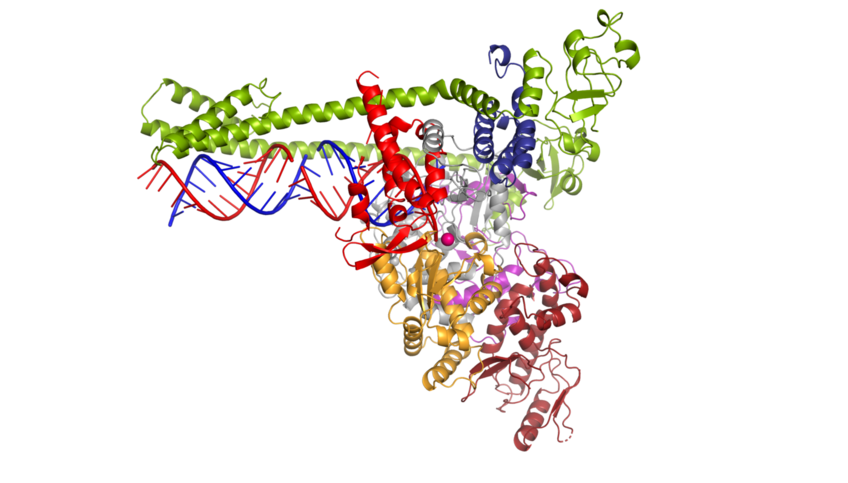Corona Research at the Institute
Teams headed by Patrick Cramer, Dirk Görlich, Marina Rodnina, Holger Stark, and Henning Urlaub have initiated research projects that should contribute to overcoming the pandemic – already with success. Patrick Cramer and his team solved the structure of the "copy machine" of the new coronavirus, which replicates the pathogen's RNA genome. If this machine is blocked the virus can not replicate anymore. This makes it possible to investigate the effect of antiviral substances which inhibit the viral copy machine. His group also found out how remdesivir interferes with the viral polymerase during copying and why it does not inhibit it completely. Their results explain why the drug has a rather weak effect. In summer 2021, Cramers team unraveled the molecular mechanisms of the corona drug Molnupiravir.
Together with researchers at the University Medical Center Göttingen (UMG), Max Planck Director Dirk Görlich's group developed mini-antibodies that efficiently eliminate the SARS-CoV-2 coronavirus and its dangerous new variants. The so-called nanobodies are currently in preparation for clinical trials.
The laboratories of Patrick Cramer, Dirk Görlich, and Henning Urlaub at the MPI-NAT are further working together with other scientists from the UMG, the University of Göttingen, and other institutions in the CoV2DiaNetGÖ network of the Göttingen Campus to develop and expand diagnostic procedures for Covid-19 infections. The network is lead by Uwe Groß and Michael Weig of the Institute of Medical Microbiology of the UMG. The test capacities there will be considerably expanded so that as many patients as possible can be tested. Each participating research group contributes laboratory equipment, devices and above all individual expertise in order to achieve success as quickly as possible and help the society in these difficult times.
They have dominated the headlines for weeks: corona vaccinations. Every day there are new reports of delays, successes, alleged dangers. What is fact, what is speculation? Stefan Kaufmann, Emeritus Director at the institute and a renowned expert on immunology and vaccines, answers central questions.
more
Related press releases
A team led by our guest group leader, David Gómez-Valera, has developed an algorithm that predicts which hospitalized COVID-19 patients are at highest risk of death and require intensive care. (in German)
more
Researchers at the MPI for Biophysical Chemistry and the University of Würzburg show that the antiviral agent incorporates RNA-like building blocks into the viral genome. This leads to mutations when the pathogen replicates. This way, it can no longer spread.
more
Researchers have developed mini-antibodies that efficiently block SARS-CoV-2 and its dangerous new variants. These so-called nanobodies bind and neutralize the virus up to 1,000 times better than previously developed mini-antibodies. In addition, the scientists optimized their mini-antibodies for stability and resistance to extreme heat. This unique combination makes them promising agents to treat COVID-19.
more
A team of researchers, including Ashwin Chari's group from the MPI for Biophysical Chemistry, has identified several candidates for drugs against the SARS-CoV-2 coronavirus. Among them are two promising compounds that are currently being investigated in preclinical studies. This drug screening – probably the largest of its kind – also revealed a new binding site on the virus.
more
The German Society for Biochemistry and Molecular Biology honored Patrick Cramer, Director at the Max Planck Institute for Biophysical Chemistry, with the Otto Warburg Medal. Virologist Christian Drosten of the Berlin Charité received the Eduard Buchner Award. At the virtual event, both scientists presented their latest results from corona research.
more
The first Covid-19 drug remdesivir is designed to suppress the rapid replication of the SARS-CoV-2 virus in human cells by blocking the viral copying machine, called RNA polymerase. Researchers at the institute and the University of Würzburg have now elucidated how remdesivir interferes with the viral polymerase during copying and why it does not inhibit it completely. Their results explain why the drug has a rather weak effect.
more
The coronavirus SARS-CoV-2 builds tiny droplets to multiply effectively inside infected cells. Researchers at the German Center for Neurodegenerative Diseases and the MPI for Biophysical Chemistry have discovered this phenomenon. It may offer starting points for drug development.
more
When a person becomes infected with the coronavirus, the pathogen multiplies rapidly in the cells of the infected person. To do so, the virus must replicate its RNA genome. This task is carried out by the viral "copy machine", the polymerase. Researchers led by Patrick Cramer have now visualized how the corona virus replicates its RNA and which 3D structure the polymerase adopts during copying. This makes it now possible to investigate the effect of antiviral substances which inhibit the viral copy machine, such as the promising compound remdesivir.
more
Background information
- Corona research: Which projects are underway at our institute?
- Interview: Voluntary work in the corona diagnostic lab of the University Medical Center Göttingen
- The new working routine with Corona
more
How they arise and what we must do about them.
A book by Stefan H. E. Kaufmann, Emeritus Director at the Max Planck Institute of Biophysical Chemistry (
in German) is available free of charge for download as PDF:
more
April 3, 2020 In the Corona crisis, the partners of the Göttingen Campus join forces in a diagnostic network for extensive testing. The initiative is coordniated by th eInstitute for Microbiology of the UMG.
more












